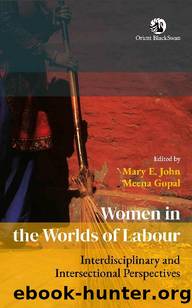Women in the Worlds of Labour: Interdisciplinary and Intersectional Perspectives by Mary E. John & Meena Gopal

Author:Mary E. John & Meena Gopal [John, Mary E. & Gopal, Meena]
Language: eng
Format: epub
Publisher: Orient Blackswan Pvt Ltd
Published: 2021-01-29T00:00:00+00:00
10
Queer, Labour and Queering Labour
An Inquiry into Gender, Caste and Class
Sunil Mohan and Rumi Harish
This chapter begins with a brief narrative of a real-life incident that took place while we were conducting a survey on the minimum wages of powrakarmikas, sanitation workers, in the city of Bengaluru. The survey was part of a struggle to build up the union of these unorganised workers.
âASâ was an old woman who worked as a powrakarmika, and was active in the union. Her daughter, also a powrakarmika, was married and heavily pregnant. Since her delivery date was due, she was staying with her mother. AS had to leave home everyday for work at 5 a.m., and would return home by 3 p.m. after work was done for the day. This meant that AS would wake up much earlier and cook for her expecting daughter before leaving for work. As most of the other women from the colony also went out for the same work, ASâ daughter was alone for better part of the day. AS was worried that if her daughter went into labour suddenly, she may not have anyone around to help her. On that particular morning, AS finished cooking for her daughter as usual and went for work. Some of us were present at ASâ workplace, doing the survey on their wages. Before noon, a messenger from the colony came to inform AS that her daughter was being taken to hospital as her labour pains had started. Though AS did not get permission from the contractor to go immediately, she managed to reach the hospital before 3 p.m. By then her daughter had delivered. It was a girl child, and her daughter was crying uncontrollably because the baby did not have three fingers on her right hand. Everybody was extremely distressed about this, and they were trying to console ASâ daughter. Strangely, however, AS was the only one who remained unperturbed and cuddled the child happily. The daughter cried loudly, clung to her mother and expressed her desolation that the child was born with three fingers missing. But AS only said, âI am happy that this child does not have three fingers. This means that she will not be able to hold a broom, as we do, to work. With her two fingers, she can hold a pen and get educatedâthis is a blessingâ. We are quite certain that had the baby been a boy, AS would have said that now he need not lift the garbage bins, and could instead get an education.
One thing that we understand from this incidentâwhich was later written into a fictional story by the famous Dalit writer of Kannada, Du Saraswathiâis that there is a need to disassociate labour from its community-based links. That gays are into the fashion industry, that Dalits are into sanitation work, that a cobblerâs son will invariably be a cobblerâall of these assumptions need to be questioned if not ruptured. Labour should be freely chosen. Only when anyone can undertake any
Download
This site does not store any files on its server. We only index and link to content provided by other sites. Please contact the content providers to delete copyright contents if any and email us, we'll remove relevant links or contents immediately.
Invisible Women by Caroline Criado Perez;(1642)
Great Goddesses by Nikita Gill(1405)
Bad Feminist by Roxane Gay(1329)
1916 in 1966 by Mary E. Daly(1285)
Hood Feminism by Mikki Kendall(1159)
Antigone Rising: The Subversive Power of the Ancient Myths by Helen Morales(1142)
The Creation of Anne Boleyn by Susan Bordo(1067)
Break the Good Girl Myth by Majo Molfino(1011)
The Beauty Myth: How Images of Beauty Are Used Against Women by Naomi Wolf(903)
How To Be A Woman by Caitlin Moran(884)
Want by Julie Peters(860)
I Am a Feminist by Adams Media(844)
Antigone Rising by Helen Morales(844)
Sway by Pragya Agarwal(789)
The Illustrated Feminist by Aura Lewis(751)
#Girlboss by Sophia Amoruso(740)
Difficult Women by Helen Lewis(705)
Becoming Cliterate by Dr. Laurie Mintz(680)
SCUM Manifesto by Valerie Solanas(678)
